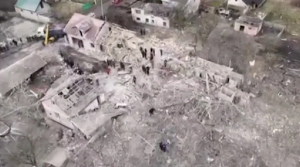Share
Human Rights Voices
While the UN devotes its human rights operations to the demonization of the democratic state of Israel above all others and condemns the United States more often than the vast majority of non-democracies around the world, the voices of real victims around the world must be heard.
Russian Federation, March 9, 2023
Ukraine war: Russian air strikes kill at least 9
Original source
At least nine people have been killed and power at Europe's largest nuclear plant has been lost after Russia launched missiles across Ukraine.
The attacks hit cities from Kharkiv in the north to Odesa in the south and Zhytomyr in the west.
Buildings and infrastructure were hit in Kharkiv and Odesa, with power blackouts in several areas. Attacks on the capital Kyiv are also reported.
Ukraine said Russia fired 81 missiles, in what is the biggest strike in weeks.
The military claimed it successfully shot down 34 cruise missiles and four of the eight Iranian-made Shahed drones which were fired.
The attacks mark the biggest day of Russian missile strikes on Ukraine since the end of January, when 11 people died after dozens of buildings were struck in several regions.
In Thursday's attacks, at least five people were killed in Lviv in western Ukraine, after a rocket hit their home, the region's governor Maksym Kozytskyi said on Telegram.
Russian shelling killed three people in the southern city of Kherson, where a public transport stop was hit, Ukraine's presidential chief of staff Andriy Yermak said.
While one person died and two others were injured following drone and missile strikes in the Dnipropetrovsk region, according to governor Serhii Lysak.
Nuclear energy operator Energoatom said a strike at the Zaporizhzhia plant meant the "last link" between the facility and the Ukrainian power system was cut off.
For the sixth time since it was taken over by Russia a year ago, the facility is now operating on diesel generators, which have enough supplies to last at least 10 days.
The director general of the International Atomic Energy Agency (IAEA) called for a commitment to protecting the safety of the plant, saying he was "astonished by the complacency" surrounding the successive strikes since the invasion began.
"Each time we are rolling a dice. And if we allow this to continue time after time then one day our luck will run out," Rafael Grossi said.
Russia-installed officials in the Moscow-controlled part of Ukraine's Zaporizhzhia region said the halt in electricity supplies to the power station from Ukrainian-held territory was "a provocation".
Ukrainian President Volodymyr Zelensky said it was "a difficult night", after Russia resumed its "wretched tactics".
He said energy systems were being restored and all services were working after the "massive" rocket attack struck critical infrastructure and residential buildings.
In Kyiv, emergency services are at the scenes of blasts in western and southern districts of the capital where the mayor, Vitaly Klitschko, said explosions had taken place.
Mr Klitschko said cars were burning in the courtyard of one residential building and he urged people to stay in shelters. Much of the city has been left without electricity, with four in 10 people without power, he added.
A mass missile attack struck an energy facility in the port city of Odesa, triggering power cuts, its governor Maksym Marchenko said. Residential areas were also hit but no casualties were reported, he added.
"About 15" strikes hit Kharkiv city and region, with "critical infrastructure facilities" and a residential building targeted, regional administration chief Oleg Synegubov said.
Other regions hit include Vynnytsia and Rivne in the west, and Dnipro and Poltava in the centre of the country.
Russian President Vladimir Putin launched his invasion just over a year ago. Since then tens of thousands of combatants and civilians have been killed or injured and millions of Ukrainians became refugees.
The US Director of National Intelligence, Avril Haines, suggested on Wednesday that President Putin might be planning to drag out the war for years but that Russia was not strong enough to launch major new offensives this year.
She said the war in Ukraine had become a "grinding attritional war in which neither side has a definitive military advantage".
"We do not foresee the Russian military recovering enough this year to make major territorial gains, but Putin most likely calculates the time works in his favour, and that prolonging the war including with potential pauses in the fighting may be his best remaining pathway to eventually securing Russia's strategic interests in Ukraine, even if it takes years," she said.
Ms Haines said Russia might turn to defending the territories it now occupies, adding that it would need additional "mandatory mobilization and third-party ammunition sources" to sustain even its level of operations in Ukraine.
Ukraine's military says it has pushed back intense Russian attacks on the embattled eastern city of Bakhmut despite Russian forces claiming to have taken control of its eastern half.
Moscow has been trying to take Bakhmut for months, as both sides suffer heavy losses in a grinding war of attrition.
"The enemy continued its attacks and has shown no sign of a let-up in storming the city of Bakhmut," the general staff of the Ukrainian armed forces said. "Our defenders repelled attacks on Bakhmut and on surrounding communities."
Between 20,000 and 30,000 Russian troops have been killed or wounded in the battle for the Ukrainian city of Bakhmut since it began last summer, Western officials say. The figures cannot be verified independently.

